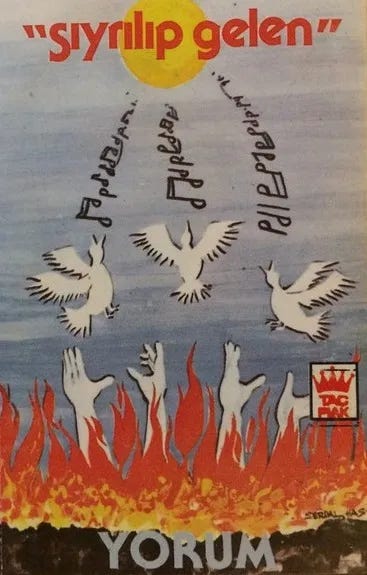EVERY GENRE PROJECT - June 5 - Özgün Müzik
Genre of the Day - Özgün Müzik 🇹🇷
Translates to “Original music” or “unique music” in Turkish
Album of the Day - Sıyrılıp gelen by Grup Yorum (1986)
June 5, 2024
Does folk music on its own innately engender political impact by stirring people? Is action-focused music enough without hands-on action in the direction the music pushes towards? Are musicians just one piece of the puzzle, or do they lie outside of it if they only perform? Folk music often has a sociopolitical element, as music that is sacred and salient to a particular group of people and place, so these are worthwhile questions to consider when considering its impact. Ultimately, these questions are subjective: music can be of considerable people-shaking power like the Singing Revolution that helped reestablish cultural and subsequent political independence in the Baltic states in the late ‘80s, or it can barely make a dent.
As a musician, walking the walk is something entirely different from talking the talk. You don’t have to do what you sing. If your words can inspire someone else to take an impassioned stance, that has some merit. Today’s group transcends the fearlessness of injecting calls to action into your music and embodies it out in the world. Although there have been several groups in the özgün müzik scene, there’s relatively scant accessible information about it, even in my beloved JSTOR. Luckily, it’s a relatively straightforward concept: it’s Turkish, politically-charged folk music mostly emerging in the late ‘80s, though my interpretation will focus on a single artist to an unusually high extent today. Despite standing as just one example, the dramatic potency of their story is enough to bolster a whole genre.
The turbulent late ‘70s in Turkey saw socialist groups, who had exploded in the ‘70s among a dissatisfied Turkish youth who saw the country as backwards, feeble, and dependent on the US order, violently clashing with right-wing nationalists. As it often goes, the left was much more scattered and disjointed than the right and was all but politically crushed by the 1980 military coup. Though at the cost of social progression, the ‘80s saw some neoliberal and military-enforced stabilization. Many Turks hadn’t forgotten the harshness of martial law and the violence of the past, though. No matter how much fortification one establishes against a pipe filling to burst, water finds a way to seep through the cracks; protest through music grew in the form of özgün müzik in the ‘80s.
Grup Yorum was founded by four college friends and eventually grew to something of a vibrant megagroup as large as the collectivism they fought for with a head-spinning amount of members over the years. Influenced by the songs of the left-wing nueva canción movement across the Spanish-speaking world, they have sonically taken aim at a wide swathe of topics from the inhumanity of capitalism and gentrification to oppressive government policies. They have also focused on positive strides for the maligned Kurdish population of Turkey. Controversially, they’ve been alleged to associate with the DHKP-C (Revolutionary People's Liberation Party/Front) though they’ve never claimed direct affiliation. Given that the DHKP-C has carried out terrorist attacks for thirty years, this makes Grup Yorum not just musically subversive but seen as a veritable threat for their cultural sway by the government. The Turkish government has arrested Grup Yorum members in hundreds of instances, but they still achieved best-selling success mirroring the frustrated and dejected mood of many Turks as greater authoritarianism has offered few political pathways to express dissent.
Their 1986 debut album “Sıyrılıp gelen” minces no words, setting their intentions for direct action and confrontation with the government for decades to come. “Büyü” paints broad strokes, criticizing executions and other forms of punitive brutality with a hauntingly unified spectral vocal, as if embodying the souls lost to political violence. The album relies on straightforward instrumentation, to connect with the widest audience possible and in order for the words to take center stage; the plaintive guitar and stirring mandolin of “Kușatma” leave room for the song’s poetic tackling of government-enforced killings to reverberate. A movement that relies on doom threatens surrender to despair, though, and the title track balances anger with hope. “Dawn is coming, obviously it's near / It is obvious that the time that will shake nature and life is near,” (translation).
“Sıyrılıp gelmektedir seher belli ki yakındır
Belli ki yakındır doğayı ve hayatı sarsacak saat”
Since their debut, they’ve put out several albums and even the occasional exposé film, and the group has faced repression and direct attacks several times by the government. Hoping to kneecap their source of strength among the people, the government even destroyed several of the group’s instruments in a raid in 2016. Tensions mounted again in a renewed atmosphere of authoritarianism President Erdoğan has enforced over his rule, leading to two members of the group declaring hunger strikes in 2019 in an attempt to free members imprisoned over allegations of involvement with the DHKP-C. The Turkish government did not budge, and Helin Bölek and İbrahim Gökçek died of their efforts in 2020. It’s a harrowing note to end on. However, it reminds us that music can drive a visceral intensity and sustain dedication to the cause for many activists under authoritarian regimes. May music continue to give those seeking freedom and fundamental rights power. Though the streaming era is a mixed bag, one of its benefits is that it allows us access to support change-minded musicians’ efforts through music like never before.




